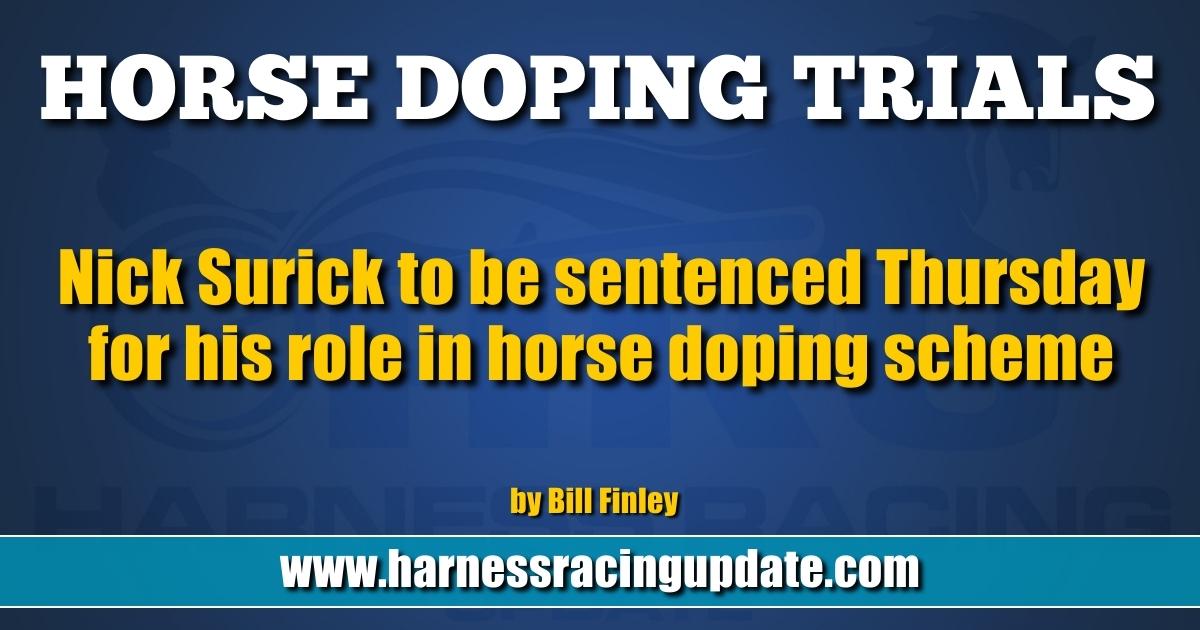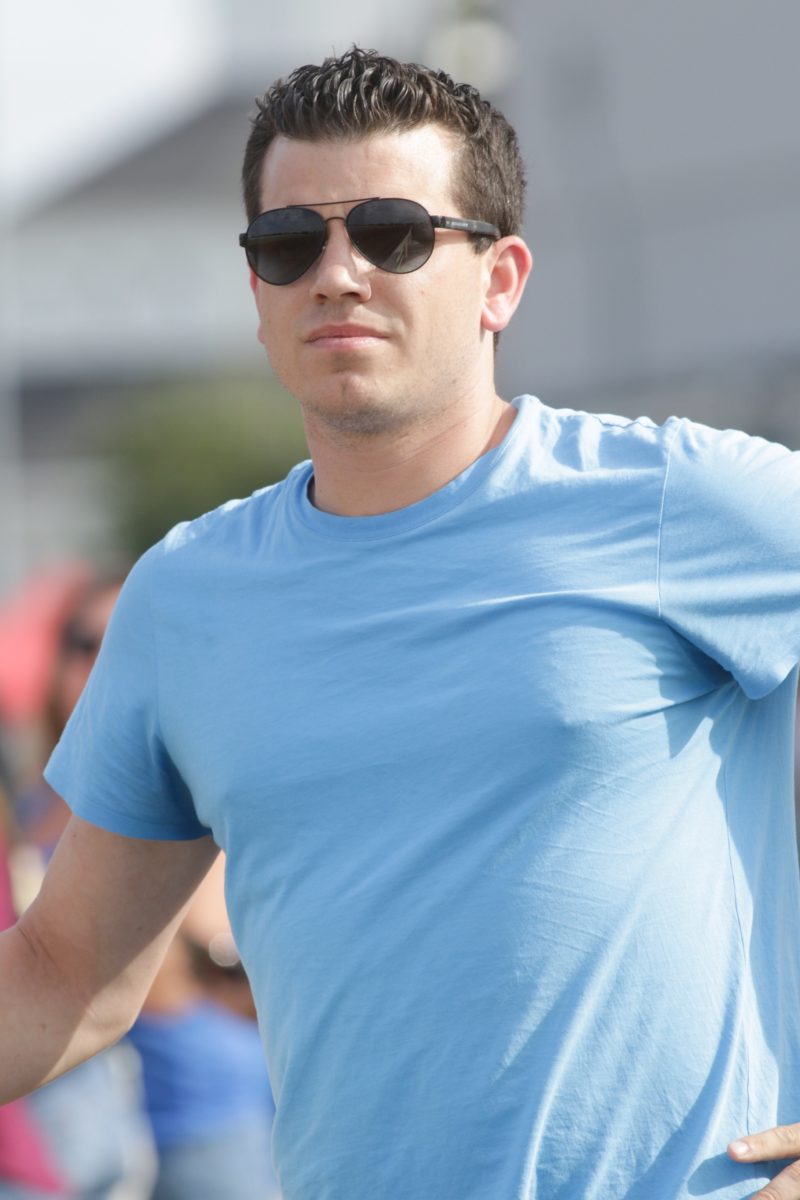

Nick Surick to be sentenced Thursday for his role in horse doping scheme
Having cooperated with investigators, the disgraced trainer is hoping to receive a reduced sentence and, perhaps, escape prison.
by Bill Finley
Despite recommendations that convicted drug cheat Nick Surick be sentenced to 72 months in prison for his role in a wide-ranging scheme to use performance-enhancing drugs on standardbreds and thoroughbreds, prosecutors have informed U.S. District Court Judge Mary Kay Vyskocil that they are in favor of a lighter sentence for the former trainer.
Surick will be sentenced Thursday (Jan. 19) at 2 p.m. ET. His lawyers have asked the court to sentence him to just 12 months of home confinement.
A Presentence Investigation Report (a legal document that presents the findings of an investigation into the “legal and social background” of a person convicted of a crime before sentencing to determine if there are extenuating circumstances which should influence the severity or leniency of a criminal sentence) called for Surick to serve six years after he pleaded guilty to one count of conspiracy to violate the drug adulteration and misbranding laws, one count of conspiracy to violate the drug adulteration and one count of obstruction of justice. Yet, the government pointed out in a filing last week that there are extenuating circumstances.
Filings from the government and Surick’s attorney revealed that Surick was eager to work with the government in order to get a reduced sentence and to strengthen the cases brought against others under indictment as well as bringing new names into the mix. However, plans to use Surick to testify against others involved in the scandal went awry when he incorrectly charged that fellow co-defendant veterinarian Rebecca Linke injected a horse Surick trained named Northern Virgin with the EPO. Linke was able to prove she was nowhere near Northern Virgin on the day he was drugged, which called into question Surick’s credibility and the ability of the government to use his testimony against others who had been charged.
Surick claimed that he did not intentionally mislead the government when it came to Linke and Northern Virgin and, instead, had trouble remembering the events. Prosecutors accepted the possibility that Surick simply made a mistake when it came to Linke.
“Nonetheless, because it is possible that the defendant did not knowingly lie to the Government regarding this event, and because of the unique circumstances of this case, the Government has not concluded that the defendant deliberately falsified the details of this event,” United States Attorney Damian Williams wrote in his submission.
Because Surick had attempted to help the government, prosecutors told the court that leniency should be considered.
“Instead, we respectfully request that the Court impose a term of imprisonment below the 72-month sentence recommended by Probation in the Presentence Investigation Report (“PSR”) in light of all the Section 3553(a) factors, taking into account the defendant’s early acceptance of responsibility, his intention to cooperate, and the need to avoid unwarranted sentencing disparities, balanced against the defendant’s inability to provide substantial assistance, and the serious nature of the defendant’s offense,” Williams wrote.
Prosecutors revealed that Surick met with investigators six times in the months between June and November 2020 in what are called “proffer sessions.” Each time, Surick agreed to voluntarily answer questions about his role in the doping programs as well as the role of others.
According to a pre-sentencing submission from Surick’s lawyers, Surick gave the government “firsthand information” on Jorge Navarro, Linke, Chris Marino, Chris Oakes, Erica Garcia, Marcos Zulueta, Michael Tannuzzo, Gregory Skleton and Ross Cohen. In addition, Surick gave the government information on others who were not indicted but the trainer alleged were also doping their horses.
“This attorney proffer also included extensive information about other potential areas of cooperation, including various trainers, engaged in potentially illegal conduct who had not been charged in any of the pending indictments in SDNY,” wrote Surick lawyer Timothy M. Donohue.
The names of those also implicated by Surick were redacted in both court filings and may never surface. So far, the U.S. Attorney’s office has given no indication that it will seek to bring charges against others not among the more than two dozen indicted in March of 2020.
Donohue wrote that Surick, “provided extensive information about numerous indicted and unindicted co-conspirators.”
Donohue also wrote that Surick has been under severe stress since being indicted, which led to a divorce and his decision to undergo therapy in 2021. According to the filing, Surick, “has admitted a history of abusing alcohol and acknowledges that his drinking problem has gotten worse since his arrest.”
After losing his racing licenses, Surick started a landscaping business and, according to Donohue, spends upwards of 15 hours a week volunteering for charities. But Surick’s attorney admitted his client’s guilt.
“After some initial success as a young man, he began skirting the rules as to when certain medications could be administered prior to a race,” Donohue wrote. “Thereafter, he began using PED’s such as red acid (a substance that he had received from his veterinarian Rebecca Linke and other trainers). He rationalized his misdeeds with the idea that ‘everyone was doing it.’”
Donohue continues: “In deciding to cooperate with the Government, Nicholas Surick made a decision that would impact the rest of his life. He realized that he had been living a lie for many years. He made the mature but difficult decision to put that part of his life behind him. He accepted total responsibility for everything he had done. He went out of his way to shed a light not only on his own misconduct but also that of many other participants in horse racing. In doing so, he understood that he would never again be licensed to participate in horse racing. Moreover, he understood that his cooperation would make him a pariah in his community. Nevertheless, he made that decision.”
















